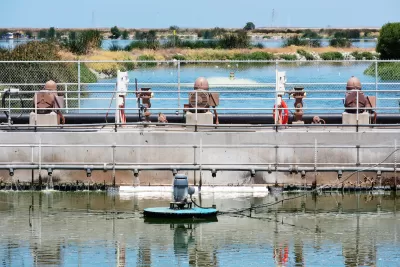The complex set of regulations will ensure recycled water makes it to taps safely.

California regulators approved the first standards for transforming sewage into potable water, reports Rachel Becker in CALmatters, paving the way for recycling and treating wastewater.
“The new rules — which have been more than a decade in the making and were mandated by a state law — outline a slew of requirements aimed at ensuring that germs and chemicals are scrubbed from treated sewage,” Becker explains.
The sewage will be bubbled with ozone, chewed by bacteria, filtered through activated carbon, pushed at high pressures through reverse osmosis membranes multiple times, cleansed with an oxidizer like hydrogen peroxide and beamed with high-intensity UV light. Valuable minerals, such as calcium, that were filtered out will be restored. And then, finally, the wastewater will be subjected to the regular treatment that all drinking water currently undergoes.
Colorado and Texas already have rules governing ‘toilet-to-tap,’ and Florida and Arizona are developing their own policies. After a final review, the California rules could be implemented sometime next year. A Southern California recycled water plant is under construction and could produce roughly 115 million gallons of water per day by 2032.
The recycled water will likely cost more than imported water, but will help secure California’s water future as water supplies in the West become more strained.
FULL STORY: California approves rules that turn sewage into drinking water

Planetizen Federal Action Tracker
A weekly monitor of how Trump’s orders and actions are impacting planners and planning in America.

Congressman Proposes Bill to Rename DC Metro “Trump Train”
The Make Autorail Great Again Act would withhold federal funding to the system until the Washington Metropolitan Area Transit Authority (WMATA), rebrands as the Washington Metropolitan Authority for Greater Access (WMAGA).

The Simple Legislative Tool Transforming Vacant Downtowns
In California, Michigan and Georgia, an easy win is bringing dollars — and delight — back to city centers.

The States Losing Rural Delivery Rooms at an Alarming Pace
In some states, as few as 9% of rural hospitals still deliver babies. As a result, rising pre-term births, no adequate pre-term care and "harrowing" close calls are a growing reality.

The Small South Asian Republic Going all in on EVs
Thanks to one simple policy change less than five years ago, 65% of new cars in this Himalayan country are now electric.

DC Backpedals on Bike Lane Protection, Swaps Barriers for Paint
Citing aesthetic concerns, the city is removing the concrete barriers and flexposts that once separated Arizona Avenue cyclists from motor vehicles.
Urban Design for Planners 1: Software Tools
This six-course series explores essential urban design concepts using open source software and equips planners with the tools they need to participate fully in the urban design process.
Planning for Universal Design
Learn the tools for implementing Universal Design in planning regulations.
Smith Gee Studio
City of Charlotte
City of Camden Redevelopment Agency
City of Astoria
Transportation Research & Education Center (TREC) at Portland State University
US High Speed Rail Association
City of Camden Redevelopment Agency
Municipality of Princeton (NJ)




























